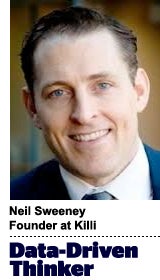 “Data-Driven Thinking” is written by members of the media community and contains fresh ideas on the digital revolution in media.
“Data-Driven Thinking” is written by members of the media community and contains fresh ideas on the digital revolution in media.
Today’s column is written by Neil Sweeney, founder at Killi.
During the lead-up to the rollout of the EU’s General Data Protection Regulation (GDPR), there was a ton of coverage about the good it might do for consumers and the challenges it would create for the digital marketing ecosystem.
And with the recent signing of the California Consumer Privacy Act (CCPA), effective Jan. 1, 2020, there are articles, blogs and op-eds about every strata of minutiae for this regulation.
But amid all this chatter, I believe some bigger issues are being missed.
The data privacy protection movement may shake the digital marketing ecosystem to its very core in two very specific ways: The in-housing trend will accelerate, and identity’s role as a currency will become clearer.
Marketers will likely bring more functions in-house
Ad agencies and holding companies, already struggling with heavy pressure on their businesses, are going to face new challenges for how they transition their data models toward more compliance and ownership. The CCPA defines personal data more broadly than GDPR and imposes tighter restrictions on data sharing for commercial purposes, including requirements that information pertaining to households and devices be handled in the same way as data covered by GDPR.
We have started to see moves such as IPG’s purchase of Acxiom, which is an attempt to solve the ownership challenge by removing their dependency on third-party providers. Will the original sources of that data pose a significant challenge as they wade through compliance-related issues heading toward the CCPA? Time will tell, but the notion of the data lake, which is so often used as a metaphor for scale and success, may in fact become a data swamp due to its inherent lack of transparency and explicit opt-ins.
We operate in a $600 billion industry with every channel, vendor and brand in the ecosystem dependent on data for its decisioning. With such dependence on third-party data – and even first-party sources – void of explicit opt-ins, many data providers will be unable to transition their models to comply with the CCPA ahead of the deadline. This could wipe out a large portion of the inventory that the industry uses to decision on daily. What then? The ripple effect will be extensive.
Should there be a reduction of data supply in the market, basic economics suggest that the price of data would rise. The pricing trend will look eerily similar to the change in price that we saw in the biddable ecosystem when advertisers moved from buying open exchange inventory to private market inventory, which was more transparent and higher quality but more expensive. If the cost of data increases 20-30%, who will pay for it and how will that affect business models that are already operating on low margins?
Any purchaser of data, including agencies, would be faced with the option of using noncompliant data – not likely, as it is the regulatory equivalent of playing Russian roulette – or accepting the increased data costs and passing this on to clients.
If the latter becomes the prevailing path and the client is in fact paying for the data, expect an acceleration of marketers taking more buying and planning functions in-house. If data is what underpins planning and buying and is the most valuable part of the value chain, why wouldn’t they take this in-house at a faster rate? If you thought the trend of marketing functions moving brand-side was growing, the CCPA will only speed it up.
Identity is the new currency, and too many are holding on to outdated models
It’s often said that data is the new currency of the information age. That’s false. Data is just the manifestation of identity. You don’t buy or store data – you buy and store identity.
GDPR and the CCPA show the new reality: Consumers are the rightful owners of their own data and identity. We often speak about first-party data, but is it really first-party? Real first-party data comes directly from the consumer, not the publisher working on behalf of its amalgamated users. This is not a subtle difference considering the number of models that rely on this amalgamated user base for data.
Too many in the digital marketing ecosystem are not acknowledging this difference – that consumer data isn’t just numbers to be crunched, but rather a collection of individuals’ personal interests, queries, locations and more – or giving it the focus it needs. In doing so, they are illustrating a lack of respect for consumer privacy and therefore exposing themselves to enormous technical and business risk.
Unless companies want to dump markets like the EU to avoid GDPR and the US prior to the CCPA, they’d better come up with a plan. Consumers must be at the core of any plan moving forward. Consumers are not opposed to their data being used on the condition that they have been included in the conversation. Any data strategy in the future must include this narrative.
It’s about time that everybody stopped looking at the trees and started taking notice of the forest that is currently smoking. The cliché has always been that where there’s smoke, there’s fire.
If you are a business today that relies on data at its core, you should be asking yourself today what you would be doing differently in January 2020. If you are not doing that now, it’s time to start or be prepared to face the fire in 16 months.
Follow Killi (@killi_io) and AdExchanger (@adexchanger) on Twitter.











